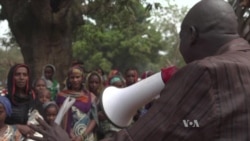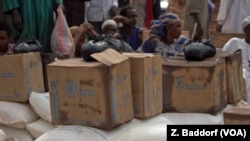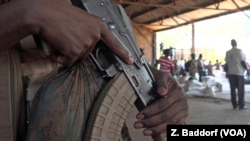In the Central African Republic, two million people, nearly half the country's entire population, face hunger as a result of reduced funding for the U.N. World Food Program.
A cutback in donations to the WFP means the U.N. agency can only offer assistance to about 600,000 people, those most in need of help.
With crises around the globe competing for donor dollars, WFP is reducing the quantity and frequency of food it supplies, and delivering that assistance to smaller numbers of people throughout Africa, in countries including Somalia, South Sudan and Uganda.
In Bambari, a flashpoint in the Central African Republic, about 115,000 people receive monthly rations from the WFP - mostly those seeking safety from fighting between armed groups.
The displaced people who are now in Bambari face major difficulties, Mayor Mathieu Bataben told VOA: "They abandoned everything. They abandoned their fields of manioc. They abandoned their fields of maize. This permitted them to subsist. Because they are far from their fields, they have no revenue. This creates a real problem of food."
Misery in IDP camp
At the site of an old cotton factory, 24-year-old Romiarde Mbiangbanga lives with about 3,000 other internally displaced people. Gutted buildings serve as shelter from the rain for some; others live in thatched huts or under lean-tos.
Mbiangbanga moved here in January 2014 after his village was attacked by a Muslim militia. He feels trapped in this camp because armed groups still roam the area.
"Because of the security, where can we search for work?" he asked. "It's because of that, we can't walk, we can't go find work anywhere. Always here."
Mbiangbanga goes into the bush to collect wood to sell in the market. He uses that extra income to supplement the food he gets from the WFP. In Bambari and across the country, rations have been cut to an average of 25 percent of normal levels.
"Nothing to eat," he said. "Here when they came to distribute, it's terribly insufficient. It's terribly insufficient."
Children's rations cut
His desperation is clear. He takes care of his five children, five orphans and his mother. "I suffer a lot."
WFP rations for schoolchildren in Bambari are being cut, too. Malnourished and highly vulnerable people, like refugees from other countries, receive full rations.
Elsewhere in the camp, 42-year-old Virginie Kada and her eight children face a similar challenge. Her husband died fighting as a soldier against a Muslim armed group. Kada brought her children here in April 2016 after he died.
"The children eat from the gardens," she explained while holding one of her toddlers. "But once that's finished, it will be difficult to get food, and I'm worried my kids will become malnourished."
Across town in a camp for internally displaced Muslims, Zenabou Hassan told VOA the WFP's food is only enough to feed her children for a week.
Militia danger
"We are in a sense obligated to sacrifice our lives to go into the bush to look for wood to sell," she said. "But we can't do anything else because we have the children. We're scared, but we have to make money to feed them."
Hassan lives in a camp consisting of abandoned government buildings. People pass by on a main road, heading into town to go to the market. Militia members with AK-47s stand guard on the side of the road as an initial force to fend off attacks from rival armed groups.
A camp leader, 56-year-old Ibrahim Abaka, said he expects the cutback in aid supplies will force displaced men to join the armed groups in order to feed their families.
"The situation is really volatile," said WFP's head in Bambari, Abdoulaye Sarr. "It's a huge frustration for me to come to a [camp]. I see how much people are suffering, and I don't have the solution."
While acknowledging that other crises around the world require resources, WFP is calling on donors to increase funding for its efforts in the Central African Republic to "avert a greater humanitarian crisis." The country's president has joined in the call, saying he wants to ensure the humanitarian situation in his country is "not forgotten or neglected."







